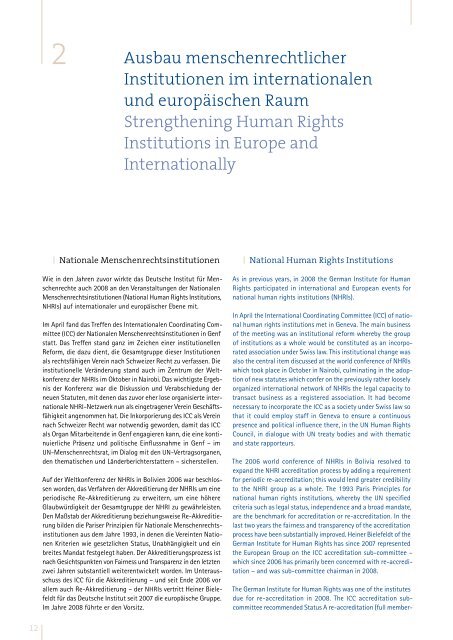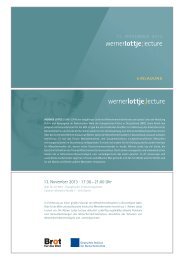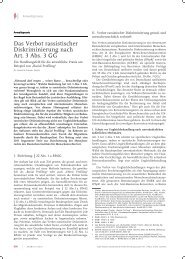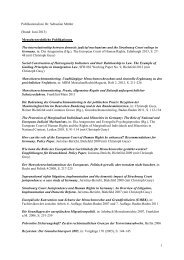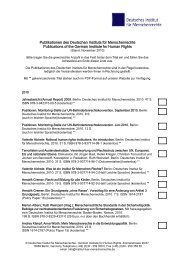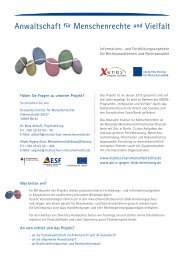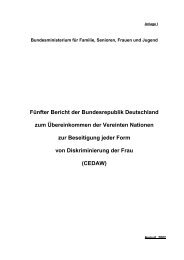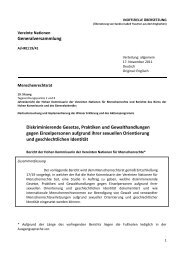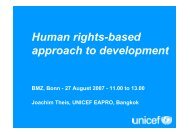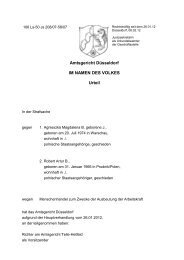Download - Deutsches Institut für Menschenrechte
Download - Deutsches Institut für Menschenrechte
Download - Deutsches Institut für Menschenrechte
Sie wollen auch ein ePaper? Erhöhen Sie die Reichweite Ihrer Titel.
YUMPU macht aus Druck-PDFs automatisch weboptimierte ePaper, die Google liebt.
2 Ausbau menschenrechtlicher<br />
<strong>Institut</strong>ionen im internationalen<br />
und europäischen Raum<br />
Strengthening Human Rights<br />
<strong>Institut</strong>ions in Europe and<br />
Internationally<br />
| | Nationale Menschenrechtsinstitutionen<br />
Wie in den Jahren zuvor wirkte das Deutsche <strong>Institut</strong> für <strong>Menschenrechte</strong><br />
auch 2008 an den Veranstaltungen der Nationalen<br />
Menschenrechtsinstitutionen (National Human Rights <strong>Institut</strong>ions,<br />
NHRIs) auf internationaler und europäischer Ebene mit.<br />
Im April fand das Treffen des Internationalen Coordinating Committee<br />
(ICC) der Nationalen Menschenrechtsinstitutionen in Genf<br />
statt. Das Treffen stand ganz im Zeichen einer institutionellen<br />
Reform, die dazu dient, die Gesamtgruppe dieser <strong>Institut</strong>ionen<br />
als rechtsfähigen Verein nach Schweizer Recht zu verfassen. Die<br />
institutionelle Veränderung stand auch im Zentrum der Weltkonferenz<br />
der NHRIs im Oktober in Nairobi. Das wichtigste Ergebnis<br />
der Konferenz war die Diskussion und Verabschiedung der<br />
neuen Statuten, mit denen das zuvor eher lose organisierte internationale<br />
NHRI-Netzwerk nun als eingetragener Verein Geschäftsfähigkeit<br />
angenommen hat. Die Inkorporierung des ICC als Verein<br />
nach Schweizer Recht war notwendig geworden, damit das ICC<br />
als Organ Mitarbeitende in Genf engagieren kann, die eine kontinuierliche<br />
Präsenz und politische Einflussnahme in Genf – im<br />
UN-Menschenrechtsrat, im Dialog mit den UN-Vertragsorganen,<br />
den thematischen und Länderberichterstattern – sicherstellen.<br />
Auf der Weltkonferenz der NHRIs in Bolivien 2006 war beschlossen<br />
worden, das Verfahren der Akkreditierung der NHRIs um eine<br />
periodische Re-Akkreditierung zu erweitern, um eine höhere<br />
Glaubwürdigkeit der Gesamtgruppe der NHRI zu gewährleisten.<br />
Den Maßstab der Akkreditierung beziehungsweise Re-Akkreditierung<br />
bilden die Pariser Prinzipien für Nationale Menschenrechtsinstitutionen<br />
aus dem Jahre 1993, in denen die Vereinten Nationen<br />
Kriterien wie gesetzlichen Status, Unabhängigkeit und ein<br />
breites Mandat festgelegt haben. Der Akkreditierungsprozess ist<br />
nach Gesichtspunkten von Fairness und Transparenz in den letzten<br />
zwei Jahren substantiell weiterentwickelt worden. Im Unterausschuss<br />
des ICC für die Akkreditierung – und seit Ende 2006 vor<br />
allem auch Re-Akkreditierung – der NHRIs vertritt Heiner Bielefeldt<br />
für das Deutsche <strong>Institut</strong> seit 2007 die europäische Gruppe.<br />
Im Jahre 2008 führte er den Vorsitz.<br />
| | National Human Rights <strong>Institut</strong>ions<br />
As in previous years, in 2008 the German <strong>Institut</strong>e for Human<br />
Rights participated in international and European events for<br />
national human rights institutions (NHRIs).<br />
In April the International Coordinating Committee (ICC) of national<br />
human rights institutions met in Geneva. The main business<br />
of the meeting was an institutional reform whereby the group<br />
of institutions as a whole would be constituted as an incorporated<br />
association under Swiss law. This institutional change was<br />
also the central item discussed at the world conference of NHRIs<br />
which took place in October in Nairobi, culminating in the adoption<br />
of new statutes which confer on the previously rather loosely<br />
organized international network of NHRIs the legal capacity to<br />
transact business as a registered association. It had become<br />
neces sary to incorporate the ICC as a society under Swiss law so<br />
that it could employ staff in Geneva to ensure a continuous<br />
presen ce and political influence there, in the UN Human Rights<br />
Council, in dialogue with UN treaty bodies and with thematic<br />
and state rapporteurs.<br />
The 2006 world conference of NHRIs in Bolivia resolved to<br />
expand the NHRI accreditation process by adding a requirement<br />
for periodic re-accreditation; this would lend greater credibility<br />
to the NHRI group as a whole. The 1993 Paris Principles for<br />
national human rights institutions, whereby the UN specified<br />
criteria such as legal status, independence and a broad mandate,<br />
are the benchmark for accreditation or re-accreditation. In the<br />
last two years the fairness and transparency of the accreditation<br />
process have been substantially improved. Heiner Bielefeldt of the<br />
German <strong>Institut</strong>e for Human Rights has since 2007 represented<br />
the European Group on the ICC accreditation sub-committee –<br />
which since 2006 has primarily been concerned with re-accreditation<br />
– and was sub-committee chairman in 2008.<br />
The German <strong>Institut</strong>e for Human Rights was one of the institutes<br />
due for re-accreditation in 2008. The ICC accreditation subcommittee<br />
recommended Status A re-accreditation (full member-<br />
12


